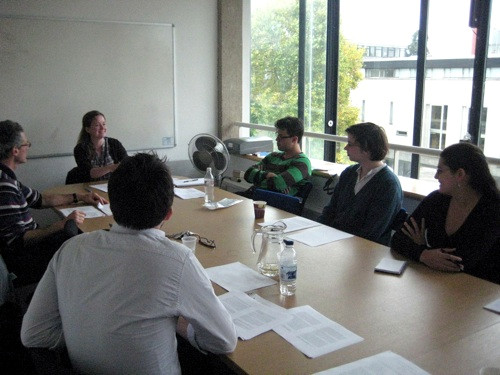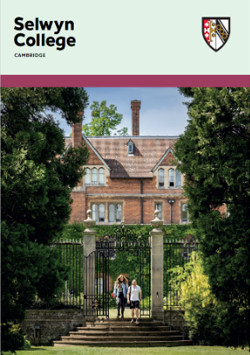The subject at Selwyn
Selwyn provides strong support for Philosophy and is able to look back on a series of distinguished results in the subject over many years. The College is just two minutes' walk from the Faculty, where most of the teaching takes place, and the fact that Selwyn is known to encourage smaller subjects is also an advantage.
There are between one and three Philosophy students in each year at Selwyn. In the first year, all students take five papers (metaphysics; ethics and political philosophy; meaning; set texts; formal methods). In the second year, student take a compulsory paper in knowledge, language and the world. In addition they select a number of papers from other areas including ethics, Greek and Roman philosophy, early modern philosophy, philosophy of science, political philosophy and experimental psychology. In the final year, the student may select a combination of papers with no compulsory subject areas. Coursework can be submitted in the place of an exam for one paper in the second year, and in place of exams in two papers in the third year. In the third year, it is also possible to submit a dissertation on any philosophical topic in place of the general paper exam..
Teaching revolves around weekly supervisions, lectures and, for some papers, discussion groups and classes. The supervision is a particularly suitable method for learning to philosophise; the students are given a weekly opportunity to deepen their understanding of the relevant subject matter and develop their critical skills.
A number of lively speakers regularly visit Cambridge and undergraduates are encouraged to join the famous Moral Sciences Club, which has hosted the likes of Derek Parfit, Judith Thomson, and Noam Chomsky. The College Library holds over 40,000 books, including those relevant to Philosophy, and stock is continually updated. The Library also provides a pleasant study area.
Selwyn has recently produced a number of young scholars who have graduated at or near the top of the University Class List, and have won College Prizes for excellence. Many of our students have gone on to undertake postgraduate study in Philosophy or other subjects, where they have again excelled.
The Teaching Fellows
Our Director of Studies for Philosophy is Dr Will Hornett, who has particular interests in the philosophy of mind, the philosophy of action, and metaphysics.
Qualities we are looking for
We are looking for ambitious and hard-working Philosophy students who relish a challenge and seek to excel. Studying at University is very different from work at school. As Philosophy is relatively rarely studied at the pre-University level, applicants are expected to demonstrate a strong interest in the subject but not expected to have studied it formally before. In addition to such an interest, applicants must be able to demonstrate a capacity for clear-headed logical reasoning and abstract thought.
If you read Philosophy at Cambridge, you will be expected to organise your own routine of study. Your supervisors will discuss a weekly essay based on intensive reading with you each week, and your Director of Studies will keep a close eye on your progress, but there will be no-one organising your daily timetable for you. It will therefore require a significant level of self-organisation and motivation.
Interviews
There are two interviews. The subject interview is conducted by the Director of Studies, usually along with another philosopher, and lasts about half an hour. You will also have a shorter general interview. This is intended to let us find out more about your motivation in applying for Philosophy at Cambridge. It is intended to give us a fuller sense of your aptitude for your chosen course, the maturity of your approach towards academic work, and your interests in and beyond Philosophy.
We asked our former Director of Studies, Dr Matt Bennett, a few questions...
What do you study in philosophy?
Philosophers think about the nature of knowledge, consciousness, moral responsibility, the nature of reality, about what we should do and how we should live together. The Cambridge Philosophy BA prepares you to tackle these questions, and at the same time, to think clearly and argue well. The Cambridge Philosophy BA is a three-year, single honours course. This means that over your time here you will study philosophy in great depth. You will not only learn about philosophy but how to do philosophy.
How will I study philosophy?

You will learn philosophy through different methods. Besides the famous Cambridge supervisions – one-on-one meetings to discuss an essay you will have prepared for that week – you will also attend lectures given by experts in their field, and you will hone your argumentative skills in discussion groups with your peers. And, of course, you will spend plenty of time in the library, too. Our student body is very active. There are many student-run philosophy societies. The Amoral Sciences Club, the undergraduate philosophy group, hosts a weekly talk given by either undergraduates or visiting speakers. The Immoral Sciences Club promotes women and non-binary students in philosophy. Students also have a say on all important decisions about the course; student representatives sit on Faculty Board and the student body is consulted through the Staff-Student Committee.
How does the Philosophy Tripos work?
The Cambridge course offers students an overview of all the main areas of philosophy through five compulsory papers in the first year. You can then choose which areas you would like to explore in more detail in optional papers in the second and third years. In the third year, you also have the option to write a dissertation on a topic of your choosing. The majority of our students study philosophy for all three years of their undergraduate course, though it is possible to take optional papers from other Triposes (e.g. Classics, Psychology).
Why is Selwyn a good place to study Philosophy?
Selwyn is a terrific place to be a student as it is a very friendly college, with excellent facilities, supportive staff, and a lively student body. Selwyn is a great college at which to study Philosophy in particular as we have a strong community of philosophy students (relatively large at 2-3 per year group) and an enthusiastic larger community of humanities students and Fellows. Philosophers at Selwyn are an integral part of the college community (for example, a couple of our recent philosophers have become JCR presidents) and have excelled academically. Plus Selwyn is perfectly located for philosophy, right next to the Sidgwick Site where classes and lectures are held!
March 2025


